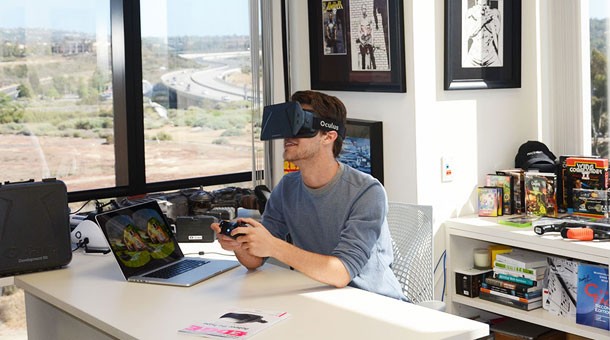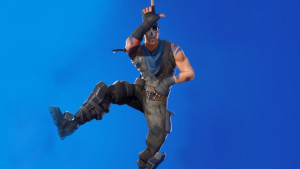Please support Game Informer. Print magazine subscriptions are less than $2 per issue
Oculus’ Acquisition 'Almost Happened Overnight'

It was just one week ago that we met with Oculus VR on the eve of the company announcing its second developer kit. Since then, Oculus inked a deal with Facebook worth $2 billion in cash and stock. Most acquisitions, especially when dealing with valuation this high, take months. Oculus’ transition from independent to acquired happened in the blink of an eye.
“Well, it almost happened overnight, believe it or not,” CEO Brendan Iribe jokes. He tells us that the team has gotten to know Facebook founder and CEO Mark Zuckerberg over the past few months. “When Mark got in and tried some of the latest demos, he asked, ‘What can I do to help? What can Facebook do to help?’” Iribe recounts.
Following the conversation with Zuckerberg, the team discussed its options. “We put our heads together and it made too much sense,” Iribe says. “If you actually understand [Facebook’s] vision of letting us be who we’re going to be, just like they wanted to let Instagram be who they are. They want to set a precedent of leaving companies alone, but integrating and being able to allow that company to leverage the momentum and strength and size of Facebook.”
Oculus and Zuckerberg brainstormed, and ultimately landed on a partnership that sees $400 million and cash and approximately $1.6 billion in stock funneled to the virtual reality startup. According to Oculus, this reduces risk, allowing the company to spend less time raising money.
More than that, Facebook’s size opens up the potential to move beyond existing mobile phone technology that powers the Rift. Cell phone technology is low cost and already being produced at scale, but it isn’t the ideal solution for the optimal virtual reality experience Oculus wants.
“What if we can take that technology a step further and make custom versions that was specifically designed for VR and make the very best experience?” Iribe says. “Let’s call those companies up and get them to make those custom parts.”
Despite the excitement, Iribe, founder Palmer Luckey, and vice president of product Nate Mitchell didn’t foresee the magnitude of the negative reaction to the announcement. “We assumed that the reaction would be negative, especially from our core community,” Mitchell told us. “Beyond our core community, we expected it would be positive. I don’t think we expected it to be so negative. As people begin to digest it a bit and think about it, you can see that Twitter and Reddit is swinging back the opposite direction. The onus is on us to educate people, and we want to share everything we’re doing.”
Since the announcement, founder Palmer Luckey has been on Reddit responding to comments. He’s assured people that there won’t be a Facebook technology tie-in, and that Oculus wouldn’t have sold if there was a fear that the company would dismantle the vision for its component parts.
Despite the tidal wave of frustration and disappointment on social media, Mitchell is upbeat. “People really shouldn’t lose hope,” he says. He points to upcoming talent recruitment efforts as one area that Facebook’s resources will bolster.
That also means a new focus on supporting independent developers and cultivating AAA support of the device. “We have struggled to properly support indie devs because we had to focus our limited resources on our closest partners, that has been a failing that I want to fix,” Luckey said on Reddit. “Indie developers are the ones driving this VR revolution more than anyone else, and one of my personal goals has been to support them in a much stronger way... Our developer relations/publishing team is really small right now, just a few guys. That is one of the reasons Oculus Share applications have taken so long, they get backed up behind the hundreds of developers we talk to every day.”
More news will be coming soon on content, a crucial piece of convincing end-users that virtual reality is a long-term proposition. Without software, the hardware is a near impossible sell for many.
“We are ramping up our developer relations in a huge way, including investment and publishing efforts,” Luckey writes. “We now have the resources to put a lot of money into indie VR content, you will be seeing some good news on that very soon.”
As for timeline, Facebook won’t be accelerating the Rift’s arrival to market. “There are things that are fixed in time that need to happen that no amount of money or partnership can move,” Luckey tells us.
He is convinced that the Facebook acquisition doesn’t change any of the major technology decisions, like the choice to use a camera and infrared LED for tracking. It will, however, positively impact the cost and quality of a first end-user designed device.
“There’s a lot of things we’re going to be able to do not just in the long-term, but in the short-term, that will make the consumer rift cheaper and higher performance without any kind of delay,” Luckey told us. “It lets us make the right tradeoffs. It allows us to make for the long-term future of virtual reality and not the current financial reality.”
“If we can sell hardware at almost no cost, that allows you to pack more quality and components into it,” Mitchell adds. “The Oculus Rift just became the ‘zero compromises’ product. It’s the best possible thing that can happen.”










